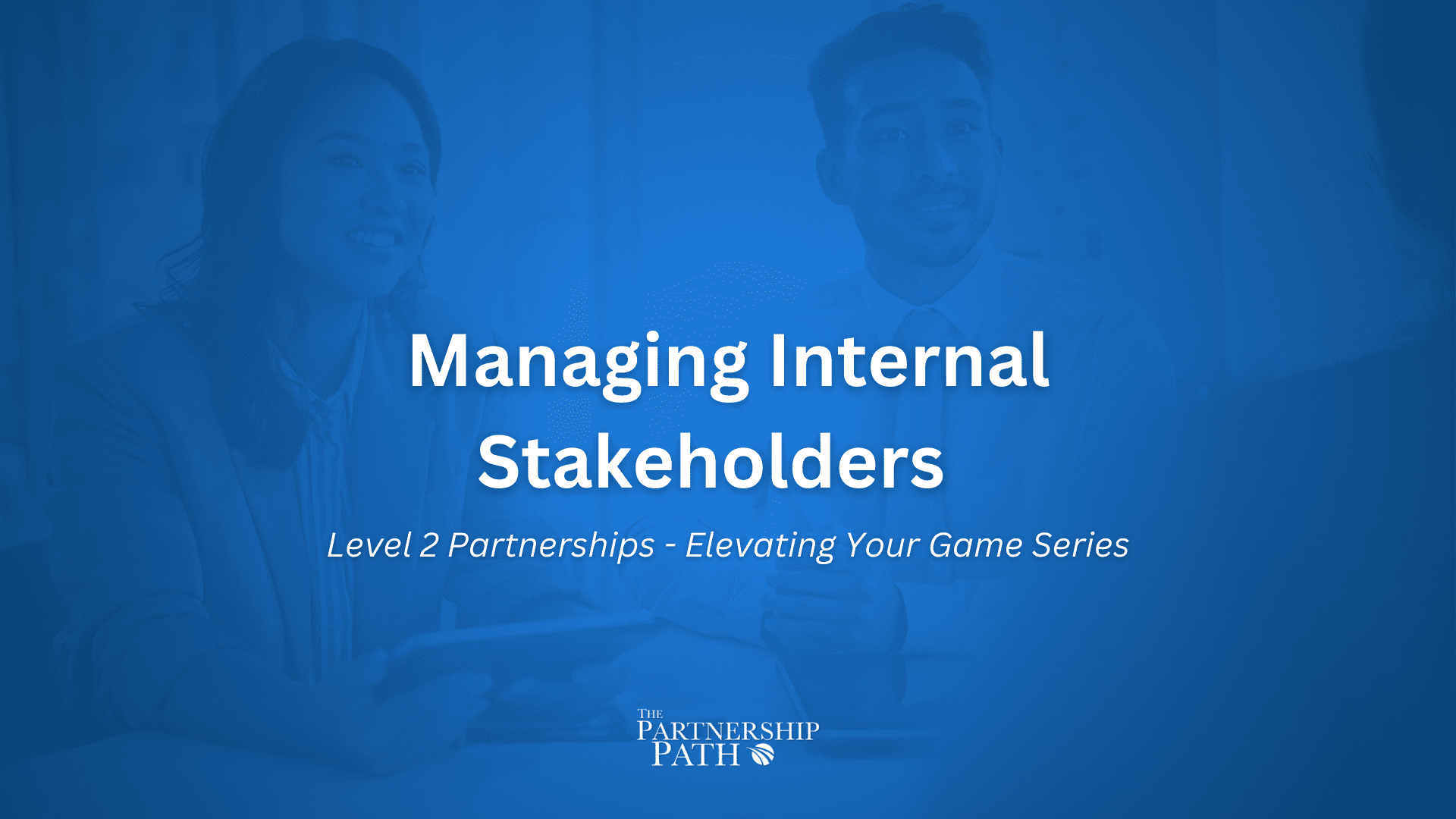Using Why to Drive Your Partnership
Episode Summary
In this episode of the Partnership Path podcast, hosts John and Toni explore the critical importance of understanding the “why” behind partnerships. Just like a diplomat bridging the gap between different parties, a partner manager must align the goals and motivations of different organizations to create successful collaborations. Tune in as John and Toni share real-world insights, expert advice, and actionable strategies to help you elevate your partner management skills.
Transcript
Hello, John.
Hey, Toni. How are you today?
Oh, good. Oh, very good. How are you?
I’m good. I’m looking forward to better weather, but I’m good.
I know. We’re all looking forward to that. Wow. Yeah. Let’s take another step with the partnership path. I have been thinking since our last episode job, which is a dangerous thing.
Uh-oh. I’m I’m nervous now.
Yeah.
But I think obviously it it relates to our our conversations relates to the podcast.
I often think that being a partner business professional, channel manager, is a lot like being a kind of a diplomat, where you’re working between two parties who may not speak the same language, who may not want to go about things in the same way, but somehow got to bring them together.
And you’ve got to bring them together often. In a document that everyone has to sign up and agree to. So I would like to hear your thoughts on how you go about bringing together the wants and needs of two separate organizations.
It’s something we can all jointly agree on.
Yeah.
I love that analogy, Tony.
Thinking about this role as a diplomat. That’s a great That’s a great parallel. I I I might steal that from you and put that into some of our content because I I really like that.
Yeah. So you’re you’re absolutely right. That analogy is exactly on target because much like that diplomatic scenario, I think partnership business planning has to start with answering a really basic question, which is why are we in business together? Like, if if both you and I can’t really super clearly articulate why we’re at the table, then what’s the point?
And and I actually think this is a really good test for, figuring out how serious your partner is, like whether the people that say they wanna be your partner are really interested in partnering or whether they just wanna use you sort of as a a me too or a, you know, kind of a a column fodder sort of offering.
Yeah.
Because if they can’t answer that key question, it gets really, really hard to put a partnership business plan together and then actually execute against that.
Yeah. Yeah. Is that is that is that where you wanna go? Is that what you wanna talk about?
Yeah. Yeah. I think so. I’ve just got these visions of people going, why are we here?
Why are we even here? Yeah. But it’s a very valid question because I remember there being you know, there are partners who want to have, gold vendor accreditation because it then gives them access to, lists or consortiums or, you know, it’s so they can so they can bid for business. And they’re like, we don’t actually we just want the badge.
So I think it’s a very valid question. Yeah.
I’m I love that example too. Right? Because that’s one of my favorite things to challenge, channel managers and partner managers on when we say, well, what What’s this partner’s goal? Like, why why do they wanna be in business with you?
And they say, oh, they wanna, they wanna achieve, you know, whatever status. They wanna be platinum. They wanna be gold. They wanna, they wanna be five star.
You know, whatever your partner program has, and you say, why? Like, okay. Why? And and to your point, if if the reason they want that is because it gets them certain things, then the goal isn’t the status.
It’s those certain things. And so having that y conversation is how we get there. Right?
Yeah.
And and I think this conversation is so important that we lead as the as the partner manager, channel managers that we lead with transparency.
Right? That when we sit down at a even at a strategic level to say, look, we’re in this to drive license revenue. We’re in this to drive consumption. We’re in this to drive, you know, our stuff. You know, obviously, we wouldn’t be here if that isn’t what we wanted. We wanna find a way to drive more of our stuff. What are you here for?
Right? And to have them actually respond hopefully with something equally transparent is how we get there, you know, for them to say, well, the truth is is we wanna get to your sales reps because we want access to your accounts. Or the truth is is we’re trying to break into a geography that we’re not in, but you are. Or we’re trying to break into an industry that we can’t seem to get into, but you’re already there. Right?
Yeah.
If if we both know what it is the other party wants, makes it so much easier to figure out. Okay. So Now how how do we build a partnership that makes sense for that? Like, what what are we gonna what are we gonna do together?
And Yeah. You know, I think to your point, that means that I think we lead with transparency, but very often that first answer isn’t transparent back and we have to challenge that. We have to we have to really challenge them. So when they say back, well, you know, we’re in this because we wanna be, we wanna be your number one go to partner.
And we should be, like, a two year old in response and say, why?
Why? So why? Yeah.
Yeah. And then they say something else and we say, yeah, but why.
Yeah, but why. Right? And and lead them down that path.
Because I I sometimes I I I don’t think it’s necessarily that the partners are being purposefully, you know, non transparent.
I just think sometimes they, don’t think it through all the way. They haven’t necessarily thought through exactly why they’re at the table, and they think we’ll, Tony’s asking me this question for a reason. I wonder what that is. So, I, you know, what would she really wanna hear from me? And then they try to give you something that they think you wanna hear.
Yeah. And it’s so, that’s so true because I think Often, I would get asked. So what is it that’s going on at Microsoft?
And why are they doing this? And when is this gonna happen? Always, what’s the roadmap for blah.
But actually, if you’re both trying to second guess what the other wants, it’s like any relationship isn’t it where you you have a fallout and you go, I thought you wanted this. They’re like, no, and you never asked me what I wanted.
Right?
So I think it is. It’s communication is is critical. And, if I think about an example I had where There was a customer that was going Google and the partner was helping them. It caused like the the the meetings I had to sit in.
But actually, what the partner really wanted was to help the chief technology officer be really successful because they want it to be a disruptor and they wanted to transform what was going on. So if we had known that, we could have gone, what can we bring to bear that will help the partner help their end customer achieve their objective? But nobody had spoken about that. So Yeah. We didn’t know too afterwards.
Yeah. And and and look, what a great what a great story. Right? Like, if you were still a partner account manager be able to sit down with another partner and tell that exact story to say, look, here’s what I’m looking for.
Let me give you let me tell you about what happened with this other partner and You know, we did this. We spent all this time. And ultimately, we were spinning our wheels until somebody finally said, no. No.
No. What we really want is this. Yeah. Then we could we connected it. And and and the truth is is this is a this is an investment from both parties.
And so knowing up front, whether it’s a good investment or not, it’s super important and super valuable.
Right?
Now Yeah.
We’ll get into this, I think, in another episode, but this is another place to to also kind of figure out, are you talking to the right people? Right? Because If you’re only talking to the other party’s Alliance manager, they don’t know. They just know that they Yeah. They were assigned the Microsoft partnership or the, you know, informatica partnership or whatever.
And the truth is they don’t maybe know what those reasons are. And so If you’re if you get if if your why questions end up in blank stare answers or I don’t know. You’re probably not talking to the right people. And that means you need to kinda readjust and go somewhere else.
Yeah. I think there’s definitely an episode in that on helping your counterpart on the other side to explore some of those things within their own business, because I know you can get parked.
Yeah.
Oh, your alliances, you you go over here. And I guess by the same token, to bring the y to the partnership. So as a a channel manager, you need to know really what’s going on in your business versus saying, well, well, I’m here because I was allocated you.
Yeah.
I you just with what you just said, Tony, I think you just named the episode. I think we’ll call this episode bringing the why to your partnership.
I like that. Yeah.
Yeah. Because that’s really what it is. Right? It it really is sitting down saying, why are we doing this? Why are you here? Why am I here? Why does this matter what you want and what I want why does it matter to the customer?
And and then let’s build a partnership around that.
Yeah. Yep.
And it should be something that’s easy.
I think we should.
Yeah.
It it usually is. It’s usually not complicated. Right? So it just asks the question why I I this is always my advice to people is act like you’re two.
Go back to, you know, when you were two.
Why? Why? Right? Only only parents of young children will really appreciate that.
Yes. Why?
I think that’s I mean, I think that’s a really good wrap up on that. Right? I think that wraps this whole thing, right, of Yeah. Of of kind of getting into being good partners. Where do you start? Start with why?
Yeah.
And, I guess then if we were to open this up to the listeners and invite them to share their insights with us, What can what can we ask? I’ve got some ideas, but I’ll let you go first, John. What can we ask him to do?
Yeah. I’d love them to hear I’d love to hear from from our listeners.
What’s the kind of an example of the best truly collaborative business conversation and ultimately business plan that you put together with a partner. And and, like, how is that different than so many of the other ones that you’ve done? And then maybe talk a little bit about kinda how what their experiences have been in terms of building the trust to get to the why. How do you how do you get someone to trust you so that they tell you they’re real lie? What are what are the ones you want here?
Yeah. Wow. I mean, I I I think that’s gonna be how do you get a partner to trust you?
I think that pretty much sums up.
That’s a whole other episode. Right?
Yeah. Yeah. But I I think I’d love to hear other people’s success stories because I think that in turn gives the community away for everyone to support one another and share a bit of best practice. So I’m looking forward to the reading how other people bring the why.
Yeah. Alright. Listeners. It’s up to you.
Key Takeaways
- The Importance of “Why”: Understanding the fundamental reasons behind a partnership is crucial for creating a successful and sustainable collaboration.
- Transparency in Communication: Leading with transparency helps build trust and ensures that both parties have aligned goals and expectations.
- Effective Business Conversations: Asking the right questions and challenging superficial answers can lead to deeper, more meaningful business relationships.
Step-by-Step Process to Effective Partner Management
- Identify the Core Motivations: Start by asking the basic question, “Why are we in business together?” This helps ensure that both parties have clear and aligned objectives.
- Foster Transparency: Be open about your goals and encourage your partner to do the same. This builds trust and lays the foundation for a strong partnership.
- Challenge Superficial Answers: Don’t accept vague or non-transparent answers. Keep asking “why” until you uncover the true motivations behind the partnership.
- Ensure Mutual Benefit: Ensure that both parties are benefiting from the partnership. This could be through access to new markets, resources, or achieving strategic goals.
- Build a Collaborative Business Plan: Develop a plan that outlines the goals, strategies, and metrics for success. Ensure that both parties are committed to the plan.



